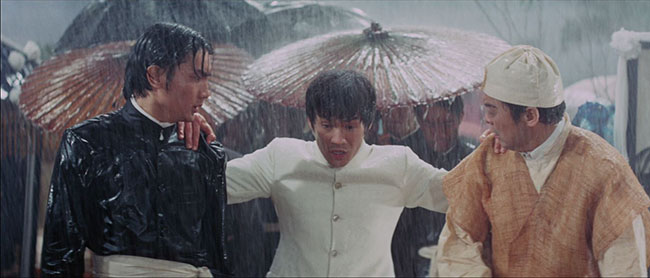So Rangers in A5e get Combat Maneuvers from the following traditions:
Biting Zephyr
Mist and Shade
Razor's Edge
Spirited Steed
Unending Wheel
I think we could reasonably create "Schools" or "Sources" for these fighting styles, and the rest of the Combat Traditions, in the world itself.
Adamant Mountain: A fighting style of Giant Warriors who ignore harm and batter enemies back, taught primarily in Musarra by Minotaur practitioners.
Biting Zephyr: An archery-centric fighting style, known pretty much everywhere but particularly common in Imba and Gresia.
Mirror's Glint: Reading your foe's movements before they're complete to fight them. Taught primarily in a Ludus or to Wealthy people.
Mist and Shade: Sneaky Fighting style which includes picking pockets mid-fight. Invented in Achelb, spread outward among Thieves.
Rapid Current: Hit and run tactics. Very popular among the Raiders of Annam and Il'sha-ah in general.
Razor's Edge: A fencing fighting style, created in Neasc but gaining in popularity, particularly in places with Gladiatorial arenas.
Sanguine Knot: Shield-Fighting with allies primarily comes from Ellenici and Imba, who use two different styles to achieve the same goal.
Spirited Steed: Invented by the Kyrani Horselords, jousting, archery, and swordsmanship on horseback is a war tactic and common exhibition.
Tempered Iron: Born in Il'sha-ah, the Tempered Iron fighting style focuses on taking down Arcanists with brutal efficiency to contain their corruption.
Tooth and Claw: With it's roots in Pre-History, Tooth and Claw is a fighting style that can never truly be formalized. It's suggested that Druids initially created the style to honor the Beast, but the truth is lost to history.
Unending Wheel: Focus and Control are the tenets of the Unending Wheel. A style born in Musarra in honor of Isra, controlling yourself allows you to control your opponent, as well.
And now you can kind of narrow down a Ranger's (Or any other Martial character's) origins by what sort of styles they use.
Biting Zephyr
Mist and Shade
Razor's Edge
Spirited Steed
Unending Wheel
I think we could reasonably create "Schools" or "Sources" for these fighting styles, and the rest of the Combat Traditions, in the world itself.
Adamant Mountain: A fighting style of Giant Warriors who ignore harm and batter enemies back, taught primarily in Musarra by Minotaur practitioners.
Biting Zephyr: An archery-centric fighting style, known pretty much everywhere but particularly common in Imba and Gresia.
Mirror's Glint: Reading your foe's movements before they're complete to fight them. Taught primarily in a Ludus or to Wealthy people.
Mist and Shade: Sneaky Fighting style which includes picking pockets mid-fight. Invented in Achelb, spread outward among Thieves.
Rapid Current: Hit and run tactics. Very popular among the Raiders of Annam and Il'sha-ah in general.
Razor's Edge: A fencing fighting style, created in Neasc but gaining in popularity, particularly in places with Gladiatorial arenas.
Sanguine Knot: Shield-Fighting with allies primarily comes from Ellenici and Imba, who use two different styles to achieve the same goal.
Spirited Steed: Invented by the Kyrani Horselords, jousting, archery, and swordsmanship on horseback is a war tactic and common exhibition.
Tempered Iron: Born in Il'sha-ah, the Tempered Iron fighting style focuses on taking down Arcanists with brutal efficiency to contain their corruption.
Tooth and Claw: With it's roots in Pre-History, Tooth and Claw is a fighting style that can never truly be formalized. It's suggested that Druids initially created the style to honor the Beast, but the truth is lost to history.
Unending Wheel: Focus and Control are the tenets of the Unending Wheel. A style born in Musarra in honor of Isra, controlling yourself allows you to control your opponent, as well.
And now you can kind of narrow down a Ranger's (Or any other Martial character's) origins by what sort of styles they use.


